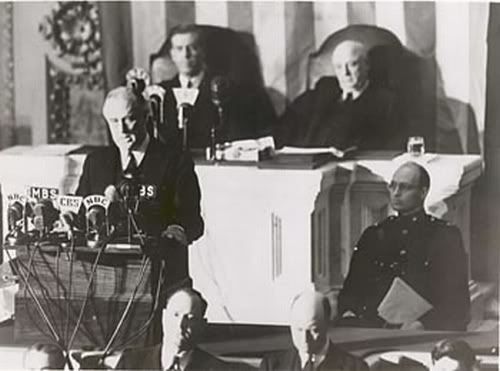Tuesday, July 08, 2008
A wishy-washy compromise

FDR addresses Congress December 7th, 1941
A commission reviewing the respective constitutional war powers of the United States President and Congress reached a wishy-washy compromise today. The commission led by two former Secretaries of State James Baker III and Warren Christopher proposed a ham-fisted arrangement.
It should be noted whenever the Clarion hears commission, our first instinctive thought, like so many others weaned on late-modern American politics of the 20th century, is, "Whitewash."
This commission was convened under the auspices of the University of Virgina. It suggested today that rather than have Congress retain its right to declare war, which has been increasingly ignored by imperial presidents since World War II, the President should have to consult Congress before deploying U.S. troops into "significant armed conflict." (Which was defined as combat operations lasting, or expected to last, more than a week.) Congress would than have thirty days to vote on a resolution of approval or disapproval. However, the President could ignore Congress's vote under the commission's proposed War Powers Consultation Act. The President would be able to veto Congress's decision to approve or disapprove, and could continue combat operations should he or she so chose.
Worse the commission proposes more bureaucracy be created according to Baker and Christopher in today's New York Times, "the act would establish a permanent, bipartisan staff with access to all relevant intelligence and national-security information."
This preposterous proposal formalizes the usurpation of Congress's constitutionally granted right to declare war. The President could unilaterally initiate combat operations. Congress could signal its disapproval and under this proposed law, the President could officially flip them the bird.
As sometime Clarion fave and former Oklahoma Congressman Mickey Edwards warns, "The commission risks undermining the Constitution's checks and balances by asking Congress to serve as the president's consultant, rather than the other way around."
Fortunately, this proposal is quite unlikely to become law. Unfortunately, an opportunity to reaffirm Congress's role in declaring war was missed.
Full text of the proposal.
Baker and Christopher's New York Times Op-Ed piece.
Labels: constitutional issues, Politics, war
Comments:
Post a Comment